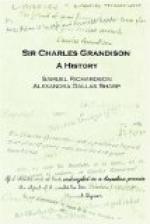Virtue, my dear! said I: What is virtue only? She who will not be virtuous for virtue’s sake, is not worthy to be called a woman: but she must be something more than virtuous for her husband’s, nay, for her vow’s sake. Complacency, obligingness—
Obedience too, I warrant—Hush, hush, my sweet Harriet! putting her hand before my mouth, we will behave as well as we can: and that will be very well, if nobody minds us. And now let us go down together.
LETTER XXII
Miss Byron.—In continuation
Thursday, April 13.
We played at cards last night till supper-time. When that was over, every one sought to engage Sir Charles in discourse. I will give you some particulars of our conversation, as I did of one before.
Lord W—— began it with a complaint of the insolence and profligateness of servants. What he said, was only answered by Sir Charles, with the word Example, example, my good lord, repeated.
You, Sir Charles, replied my lord, may indeed insist upon the force of example; for I cannot but observe, that all those of yours, whom I have seen, are entitled to regard. They have the looks of men at ease, and of men grateful for that ease: they know their duty, and need not a reminding look. A servant of yours, Sir Charles, looks as if he would one day make a figure as a master. How do you manage it?
Perhaps I have been peculiarly fortunate in worthy servants. There is nothing in my management deserving the attention of this company.
I am going to begin the world anew, nephew. Hitherto, servants have been a continual plague to me. I must know how you treat them.
I treat them, my lord, as necessary parts of my family. I have no secrets, the keeping or disclosing of which might give them self-importance. I endeavour to set them no bad example. I am never angry with them but for wilful faults: if those are not habitual, I shame them into amendment, by gentle expostulation and forgiveness. If they are not capable of a generous shame, and the faults grow habitual, I part with them; but with such kindness, as makes their fellow-servants blame them, and take warning. I am fond of seeking occasions to praise them: and even when they mistake, if it be with a good intention, they have my approbation of the intention, and my endeavours to set them right as to the act. Sobriety is an indispensable qualification for my service; and for the rest, if we receive them not quite good, we make them better than they were before. Generally speaking, a master may make a servant what he pleases. Servants judge by example, rather than precept, and almost always by their feelings. One thing more permit me to add; I always insist upon my servants being kind and compassionate to one another. A compassionate heart cannot habitually be an unjust one. And thus do I make their good-nature contribute to my security, as well as quiet.




